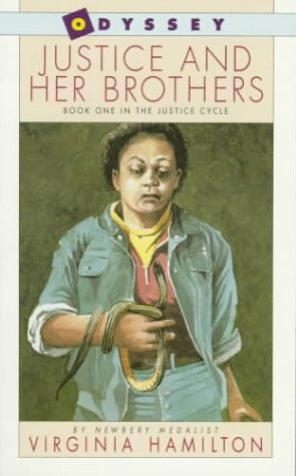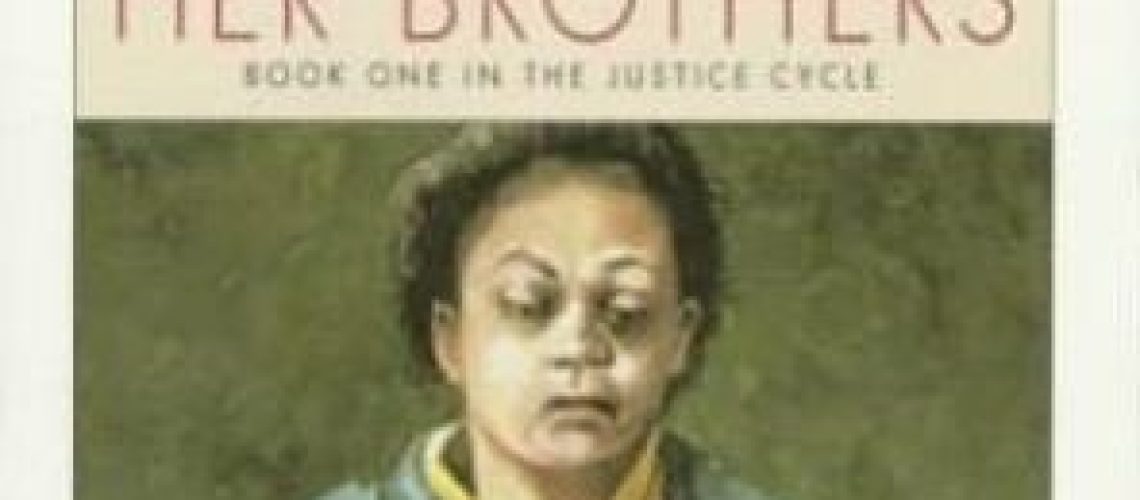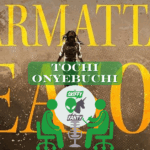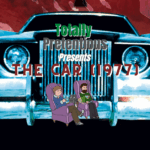Justice flicked her eyes this way and that. All else around the parlor appeared ordinary. The light of sun set the room aglow in corners and on walls. It was an eerie effect, but not something she hadn’t seen before. The house was stifling, as it had been for weeks. But there was nothing odd about sunlight, about heat, at this early hour. Yet, since the summer started, she’d got the notion at times that something deadly strange was going on.
When I was considering what book to read for Black History Month, I was once again struck with how inadequate my small library of childhood favorites is in representing any perspective that is not white. Thank goodness for Google. I’m upset with the system that existed in my small, very white town. A system that seems to have excluded voices of color and, indeed, made attempts on numerous occasions to explicitly do so. All of this means that I was never introduced to the exceedingly talented Newbery Medalist author, Virginia Hamilton. I suspect this is not JUST because she is a black woman, but because, at least when it comes to Justice and Her Brothers, one could easily mistake her work for “Not Sci-fi.” This is a mistake that needs immediate rectification because nothing could be further from the truth.

Justice and Her Brothers is the story of a young girl, Justice, living in a large house at the end of a long drive, across a large field from the rest of her small neighborhood. Her father is a stone-mason, her mother has just recently returned to college, and so she is left at home with her twin brothers, Tom-Tom (Thomas) and Lee (Levi). However, there’s something a bit strange about her brothers and Justice is in a near constant state of discomfort around Tom-Tom, the barely elder of the two (or is he?). Where Lee is calm, quiet, studious, and responsible, Tom-Tom is a boy of fierce energy and near manic charisma. He has called for a Snake Race that Justice is determined to participate in, despite the fact that it seems only for the boys in the neighborhood, but her parents have demanded that she be included in all things, which Tom-Tom resents. All of this seems terribly normal, from Justice’s desire to show off a bike trick she has learned, to her tendency to hang out with a young stay-at-home mother, Mrs. Jefferson. It’s a household that is dealing with a big change and a little girl that is suddenly forced to find her place away from her parents.
The sense of pervasive unease and nearly claustrophobic heat is immediately apparent in Justice and Her Brothers. This is an incredibly atmospheric novel and you can feel the sense of location throughout the entirety. Things move between the interior of the house, to the large property, through the neighborhood and town, and all the way to the Quinella Trace, a dark river with a sense of trauma surrounding it, you almost always know exactly where you are. The few times that things become vague is a deliberate choice on Hamilton’s part as it creates an interior divide that plays heavily into the thing that ultimately makes this book very much a science fiction novel. I don’t want to spoil it for you, however, because the narrative is a journey of discovery for Justice, her brothers, and for you, the reader.
It’s always interesting reading these novels that are clearly targeted to middle grade or YA readers because it turns out there’s a great deal of nuance in how the adults are portrayed and is indicative of how skilled some of these writers really are. I’m sure I wouldn’t have identified so strongly with Justice’s parents, her mother in particular. I found it fascinating that the point of view shifted to Justice’s mother at least once over the course of the novel, so that we could hear her own internal struggles with leaving her children after years of staying at home. This is a less common narrative these days, but having gone through it myself and still feeling the guilt of those years that I had to be away from my kids, while simultaneously pride in my work, I was keenly aware of how this wasn’t just a book about children gaining independence from parents, but also about parents letting their children go.
However, by the same turn, if I had any complaint it would be that the shifts in POV were occasionally bewildering and disorienting. To an extent I believe this was another deliberate choice of Hamilton’s, but I could see a younger reader having a much harder time with it than I did. Additionally, though this is adamantly science fiction, the answers to your questions will not be answered during Justice and Her Brothers. I suspect that those answers will be forthcoming in the second book of The Justice Cycle, but, fair warning, you might be confused as to what exactly is going on when you’re finished. I’m still not entirely certain how two characters play into the overarching plot, or how the mechanics of the system work. However, I can’t decide if my slew of questions is a feature or a bug, because I’m definitely invested in continuing the story.
I still have no idea why I was never introduced to Virginia Hamilton as a child, but I am so glad that I now have the pleasure of catching up with her extensive writing career. It’s particularly interesting, given my recent discussion with Troy L. Wiggins and Eden Royce, that Justice and Her Brothers is a book by a Black writer that seems to defy the usual genre labels. For most of the book, the speculative is more of an intrinsic part of the environment than it is a thing to be set out and labeled. You may not even be completely aware that there’s anything unreal until at least a third of your way through because the book is so invested in the real: a little girl desperate to hang with her brothers, a boy with a stutter desperate to be heard, another boy struggling to maintain his identity in the face of a much louder sibling, and parents just trying to do right by their children. All of these elements are the heart of Justice and Her Brothers and it’s all the more compelling because of them. So, if you’re like me and you’ve found that you have a bit of a gap in your childhood reading, do yourself a favor and pick this one up; I promise you won’t regret it.







